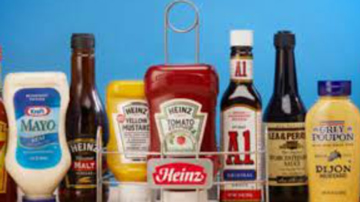Kraft Heinz targets reducing virgin plastic use in packaging

The third-largest food and beverage company in North America, Kraft Heinz Co, has agreed to work towards a goal to reduce its total virgin plastic use in the packaging of its products. The company agreed to set a goal to reduce total virgin plastic use following the filing of a shareholder proposal and engagement with As You Sow, a non-profit foundation chartered to promote corporate social responsibility through shareholder advocacy, coalition building, and legal strategies.
According to a news release from As You Sow, the proposal asked Kraft Heinz to report on how the company would reduce plastic packaging, including planned reduction strategies or goals, materials redesign, substitution or reductions in the use of virgin plastic.
The company says it intends to set a substantial virgin plastic packaging reduction goal later this year or in the first quarter of 2023. In response, As You Sow agreed to withdraw its shareholder proposal.
In a statement given to As You Sow, Kraft Heinz says it will launch a variety of initiatives and investments, including reduction of virgin plastic material, packaging redesign and increased use of recycled content. The company says it also would continue the exploration and scaling of reuse models.
“We were pleased to reach this agreement with Kraft Heinz that involves a substantial virgin plastic reduction goal for packaging including consideration of packaging redesign and innovative reuse models,” said Conrad MacKerron, senior vice president at As You Sow. “We have similar pending proposals at Amazon, McDonald’s, and Kroger and hope that those companies can agree to reductions in the use of plastic for packaging.”
As You Sow says, “Kraft Heinz lags peers in reducing risk from plastic packaging use. Competitor Unilever has taken the most significant action to date, agreeing to cut virgin plastic packaging use by 50% by 2025, including absolute elimination of 100,000 tonnes of plastic packaging. Seventeen other consumer goods companies have virgin plastic reduction goals, including Procter & Gamble, Colgate-Palmolive, Nestlé, and Target. Kraft Heinz has no virgin plastic reduction goal.”
It added that Nestlé uses 4.2% recycled content in its plastic packaging, while 15 other companies report using 2-10% recycled content plastic. “Twenty-three competitors have time bound goals to improve use of recycled content plastic in packaging. Kraft Heinz does not report use of any recycled content plastic and has no recycled plastic content goal,” it furthered.
As You Sow also contends that “up to 30% of Kraft Heinz’s packaging is flexible plastic film, which cannot be recycled. Flexible packaging represents 59% of all plastic production but an outsized 80% of plastic leaking into oceans.”
Five other large companies, Keurig Dr. Pepper, Mondelez International, PepsiCo, Target Corp. and Walmart, agreed to virgin plastic reductions in 2021 after the filing of shareholder proposals by As You Sow. Target and Keurig Dr. Pepper agreed to reduce virgin plastic in brand packaging by 20%, Walmart to 15% and Mondelez agreed to cut 5% by 2025. PepsiCo agreed to a 20% cut by 2030.
As You Sow says the reduction in the use of virgin plastic announced by these brands is expected to total more than 700,000 tonnes.
It adds that the largest cut in overall plastic use to date by a major consumer goods company was a 2019 commitment by Unilever to cut virgin plastic use by 50%, including a total elimination of 100,000 tonnes of plastic packaging by 2025.
As You Sow also adds, “The growing plastic pollution crisis poses increasing risks to our company. Corporations could face an annual financial risk of approximately US$100 billion should governments require them to cover the waste management costs of the packaging they produce, a policy that is increasingly being enacted around the globe.”
Recently, Pew Charitable Trusts released a groundbreaking study, Breaking the Plastic Wave, concluding that if all current industry and government commitments were met, ocean plastic deposition would be reduced by only 7%. Without immediate and sustained new commitments throughout the plastics value chain, annual flows of plastics into oceans could nearly triple by 2040.
The Pew report also finds that improved recycling is insufficient to stem the plastic tide, and must be coupled with reductions in use, materials redesign, and substitution. It also finds that at least one-third of plastic demand can and should be reduced. The report states that reducing plastic production is the most attractive solution from environmental, economic, and social perspectives. The European Union has banned 10 single-use plastic products commonly found in ocean clean-ups and enacted a US$1/kg tax on non-recycled plastic packaging waste.
(PRA)
Subscribe to Get the Latest Updates from PRA Please click here
©2022 Plastics and Rubber Asia. All rights reserved.

©2022 Plastics and Rubber Asia. All rights reserved.
Home Terms & Conditions Privacy Policy Webmail Site Map About Us


















